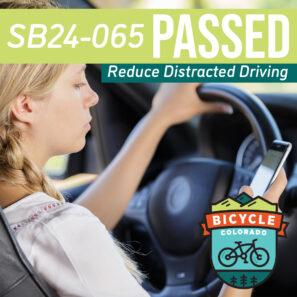Bike Law Q&A: What to do if you’re involved in a crash
Brad Tucker is an avid cyclist, vice president of Bicycle Colorado’s board of directors and an attorney in his 26th year of practice with a specialty in bicycle liability and insurance issues. If you have questions concerning legal issues affecting cyclists, you can contact him at brad@colobikelaw.com. Photo courtesy of rodeo-labs.com.
Q: What should people do if they’re involved in a crash?
None of us like to think about being involved in a crash, but it’s important to know what to do if we are. First of all, take a few minutes right now to think about whether you have insurance that will protect you in the event of a crash. More than 15% of Colorado motorists are uninsured. You can add uninsured/underinsured motorist coverage to your auto insurance policy or obtain a “non-owner operator policy” with uninsured/underinsured motorist coverage if you’re a car-free cyclist.
If you are unfortunate enough to be involved in a crash, there are a few basic things to remember to do following the crash:
You have the right to ask law enforcement to investigate
Reporting the crash will initiate an investigation process and create an official record of the occurrence. Failing to report the crash can have a serious impact on your ultimate ability to recover the damages you sustain in it. Law enforcement involvement will further assure that you are getting accurate insurance information from the other party. That information will appear on the official Traffic Accident Report. If it is a hit-and-run collision, it is potentially even more important that you report the crash and initiate a law enforcement investigation. Even if the driver cannot be located, you can still pursue damages under your uninsured motorist coverage.
Seek medical attention
It’s been my experience that many cyclists delay or avoid medical attention, but this is no time to be a hero. Get the treatment you need, and let the process play itself out. If you have health insurance, you will use that as your primary source of payment for treatment.
Gather contact information from witnesses
Get a business card or as much contact information as they are willing to provide.
Do not argue fault with the other party or law enforcement
There is no obligation to even speak to the at-fault party about the collision, and there is no real advantage to doing so. If a law enforcement officer appears to be wrongfully holding you responsible for the collision, it is important that you state your version of how it occurred, but there is little to be gained by engaging the officer in an argument.
Take pictures
Photograph all visible injuries and damaged equipment once you’ve received emergency treatment.
You can file a statement
You have the right to file a statement as a supplement to the official Traffic Accident Report, if you are unable to give a statement at the scene because you are immediately transported in an ambulance for emergency medical care. This is often an important way to document your perspective of the collision in an official record.
Following these basic tips will get you going in the right direction. There is no question, however, that you would be wise to contact an experienced bicycle attorney to further protect your rights.
The information in this column is provided as a public service. It is not legal advice and should not be interpreted as such. Bicycle Colorado does not provide legal counsel nor endorse any legal counselor.
Leave A COMMENT
Our twitter feed is unavailable right now.









COMMENTS (3)
david -
Good advice- but very basic info. The teaser said Cycling law Q&A
I thought the article would cover the rules of law for cyclists and motorists.
Katherine Fuller -
That’s why we called it “What to do if involved in a crash.” You can find complete info on rules of the road here on our site: https://www.bicyclecolorado.org/ride-colorado/rules-of-the-road/ Thanks!
Bill W -
Why are those cyclist in the middle of the road? You should use pictures of cyclist riding correctly and safely.